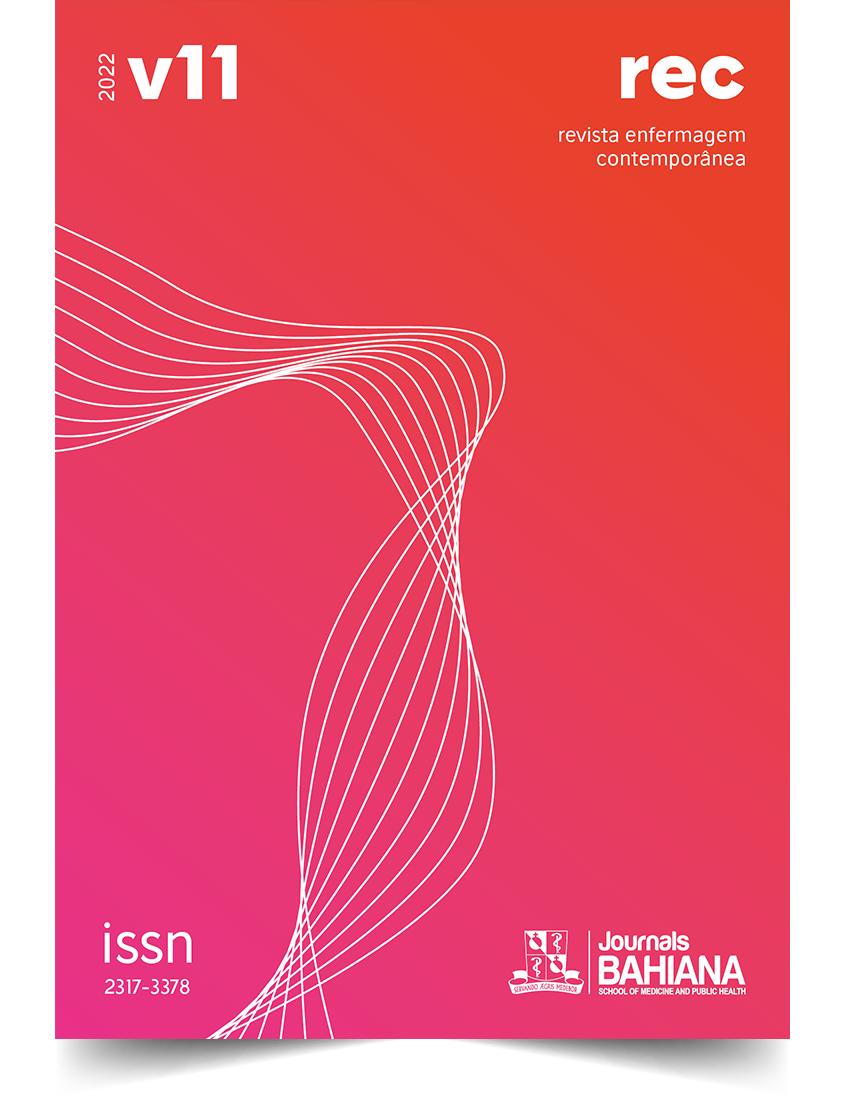Vaccination against COVID-19 in national territory
DOI:
https://doi.org/10.17267/2317-3378rec.2022.e4714Keywords:
Vaccination coverage, Vaccines, CoronavirusAbstract
ABSTRACT
OBJECTIVES: To analyze the vaccination against COVID-19 through the records in the national territory in the period from 2021 to 2022. MATERIALS: It consists in an ecological descriptive retrospective study, in which the collection of information was held in May 2022, extracted from the LocalizaSUS portal, via the Vacinômetro-SUS panel, in the period of January 17, 2021, to May 21, 2022. RESULTS: On May 21, 2022, Brazil presented, through the Ministry of Health panel about COVID-19, 429.803.859 doses were administered, clarifying the COVID-19 vaccination progress in the national territory. The data collected identified a higher vaccination rate in females (53,3%), in young adults between 20 e 59 years of age (64,1%), and lower values in the population over 60 years (21,6%). Considering the geographical division, the southeast region of the country presents a higher number of administered doses against COVID-19 (353.197.267 doses), and concerning the federative units, the state of São Paulo precedes the others in this aspect. CONCLUSION: The application of the vaccines against COVID-19 in the Brazilian states is heterogeneous. Despite these facts, the study verifies that Brazil obtained a satisfactory result in the vaccinal progress against COVID-19 in all national territory.
Downloads
References
(1) World Health Organization. WHO Coronavirus (COVID-19) Dashboard [Internet]. World Health Organization; 2021. Available from: https://covid19.who.int/
(2) Boschiero MN, Palamim CVC, Marson FAL. The hindrances to perform the COVID-19 vaccination in Brazil. Hum Vaccin Immunother. 2021;17(11):3989-4004. https://doi.org/10.1080/21645515.2021.1955607
(3) Castro R. Vacinas contra a Covid-19: o fim da pandemia? Physis. 2021;31(1):e310100. https://doi.org/10.1590/S0103-73312021310100
(4) Lana RM, Freitas LP, Codeço CT, Pacheco AG, Carvalho LMF, Villela DAM, et al. Identification of priority groups for COVID-19 vaccination in Brazil. Cad. Saúde Pública. 2021;37(10):e00049821. https://doi.org/10.1590/0102-311X00049821
(5) Silva Filho PSP, Silva MJS, Fortes Júnior EJ, Rocha MML, Araújo IA, Carvalho ICS, et al. Coronavirus vaccines (COVID-19; SARS-COV-2) in Brazil: an overview. Res., Soc. Dev. 2021;10(8):e26310817189. https://doi.org/10.33448/rsd-v10i8.17189
(6) Ministério da Saúde (Brasil). Vacinômetro COVID-19 [Internet]. Brasília: Ministério da Saúde; 2022. Available from: https://infoms.saude.gov.br/extensions/DEMAS_C19_Vacina_v2/DEMAS_C19_Vacina_v2.html
(7) Carvalho JC, Cunha F, Coutinho IA, Loureiro C, Faria E, Bom AT. Hypersensitivity Reactions to Vaccines: Current Evidence and Standards for SARS-CoV-2 Vaccines. Acta Med Port. 2021;34(7-8):541-547. https://doi.org/10.20344/amp.16096
(8) Lima MA, Rodrigues RS, Delduque MC. Vacinação contra a COVID-19: Vaccination against COVID-19: advances in the health sector in Brazil. Cad. Ibero-amer. Dir. Sanit. 2022;11(1):48-53. https://doi.org/10.17566/ciads.v11i1.846
(9) Santana EC, Varela MC, Arámboles YJ, Almonte AT, Rodríguez AG, Núñez VM, et al. Barreiras para a Imunização na América Latina e Covid-19. Braz J Infect Dis. 2022;26(1):90-1. https://doi.org/10.1016/j.bjid.2021.102162
(10) Kabad, J, Souto EP. Vaccination against COVID-19 as a social right and protection for the older population in Brazil. Rev. Bras. Geriatr. Gerontol. 2022;25(1):e210250. https://doi.org/10.1590/1981-22562022025.210250
(11) Hawkes S, Pantazis A, Purdie A, Gautam A, Kiwuwa-Muyingo S, Buse K, et al. Sex-disaggregated data matters: tracking the impact of COVID-19 on the health of women and men. Econ Polit (Bologna). 2022;39(1):55-73. http://dx.doi.org/10.1007/s40888-021-00254-4
(12) Oliveira BLCA, Campos MAG, Queiroz RCS, Alves MTSSB, Souza BF, Santos AM, et al. Prevalence and factors associated with covid-19 vaccine hesitancy in Maranhão, Brazil. Rev. Saude Publica. 2021;55:1-12. https://doi.org/10.11606/s1518-8787.2021055003417
(13) Global Health 50/50. The Global Health 50/50 Report 2020: Power, Privilege and Priorities [Internet]. London; 2020. Available from: https://globalhealth5050.org/wp-content/uploads/2020/03/Power-Privilege-and-Priorities-2020-Global-Health-5050-Report.pdf
(14) Endler M, Al-Haidari T, Benedetto C, Chowdhury S, Christilaw J, El Kak F et al. How the coronavirus disease 2019 pandemic is impacting sexual and reproductive health and rights and response: Results from a global survey of providers, researchers, and policy-makers. Acta Obstet Gynecol Scand. 2021;100(4):571-78. https://doi.org/10.1111/aogs.14043
(15) Sutton D, D'Alton M, Zhang Y, Kahe K, Cepin A, Goffman D, et al. COVID-19 vaccine acceptance among pregnant, breastfeeding, and nonpregnant reproductive-aged women. Am J Obstet Gynecol MFM. 2021;3(5):100403. http://dx.doi.org/10.1016/j.ajogmf.2021.100403
(16) Rocha TAH, Boitrago GM, Mônica RB, Almeida DG, Silva NC, Silva DM, et al. National COVID-19 vaccination plan: using artificial spatial intelligence to overcome challenges in Brazil. Ciênc. Saúde Colet. 2021;26(5):1885-98. https://doi.org/10.1590/1413-81232021265.02312021
Downloads
Published
Issue
Section
License
Copyright (c) 2022 Nelson Silva Rodrigues Júnior, Stefane Marinho Moreno, Marília Girão de Oliveira Machado, Antonio Alberto Ibiapina Costa Filho, Aline Raquel de Sousa Ibiapina

This work is licensed under a Creative Commons Attribution 4.0 International License.
This work is licensed under a Creative Commons Attribution 4.0 International License.



